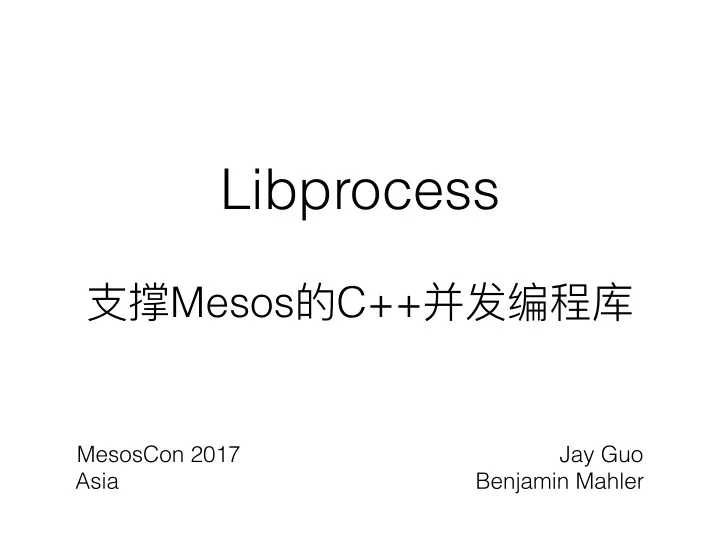

Libprocess �� Mesos � C++ ����� MesosCon 2017 Jay Guo Asia Benjamin Mahler
Libprocess Overview • Libprocess is a C++ library for building systems out of composable concurrent components libprocess ��� C++ ���� “ ��� ” ���������� • Mesos is built atop Libprocess, used heavily in production. Mesos ��� libprocess �������������� • Libprocess has been a great help in making Mesos highly scalable and responsive. libprocess �� Mesos �������������
��������������������������� Development • Originally authored by Benjamin Hindman, development now driven by the Mesos project: 3rdparty/libprocess in github.com/apache/mesos ���� Benjamin Hindman ������� Mesos ���� • But, treated as a separate project in terms of commits. May be moved out fully from Mesos, but not at the current time �� Mesos ������������
������������� ��� �� ��� ������ Motivation for Libprocess Libprocess ��� • Concurrency is hard ���������� • Not only correctness , but also performance ���������������� • We want composable concurrency, in order to safely build an efficient highly concurrent system
��������� �������� Building Blocks for Concurrent Systems • Need to be able to program asynchronously
��������� ������������ Building Blocks for Concurrent Systems • Need to be able to program asynchronously �������� • Requires a different programming model: handle_request(Request r) { doA(); doB(); doC(); send response }
������������ ��������� Building Blocks for Concurrent Systems • Need to be able to program asynchronously �������� • Requires a different programming model: handle_request(Request r) { doA(); } what if A,B,C take a really long time? doB(); should we tie up the request handling “thread”? � A,B,C ��������������������� doC(); send response }
��������� ������������ Building Blocks for Concurrent Systems • Need to be able to program asynchronously �������� • Requires a different programming model: handle_request(Request r) { doA(); } what if B,C can run in parallel but both depend on A? How doB(); do we express that? ���� B,C ���������� A ���������� doC(); send response }
�� ��������������������������� ���� �� �������������� Asynchronous Programming • Two schools of thought: ����� 1. Implicit : Async programming is too hard for programmers. Make it look synchronous, and have it be asynchronous under the covers. ���������� 2. Explicit : Expose asynchronicity directly to programmers.
���� Asynchronous Programming 1. Implicit approach, example from Golang �� ������ Go �� func echo_handler( response http.ResponseWriter, request *http.Request) { body, error := ioutil.ReadAll(request.Body) io.WriteString(w, string(body)) } func main() { http.HandleFunc("/test", test) log.Fatal(http.ListenAndServe(":8082", nil)) }
���� Asynchronous Programming 1. Implicit approach, example from Golang �� ������ Go �� func echo_handler( response http.ResponseWriter, request *http.Request) { looks } body, error := ioutil.ReadAll(request.Body) io.WriteString(w, string(body)) synchronous } func main() { http.HandleFunc("/test", test) log.Fatal(http.ListenAndServe(":8082", nil)) }
���� Asynchronous Programming 1. Implicit approach, example from Golang �� ������ Go �� func echo_handler( io.ReadCloser response http.ResponseWriter, request *http.Request) { looks } body, error := ioutil.ReadAll(request.Body) io.WriteString(w, string(body)) synchronous } func main() { http.HandleFunc("/test", test) log.Fatal(http.ListenAndServe(":8082", nil)) }
���� Asynchronous Programming 1. Implicit approach, example from Golang �� ������ Go �� func echo_handler( response http.ResponseWriter, request *http.Request) { looks } body, error := ioutil.ReadAll(request.Body) io.WriteString(w, string(body)) synchronous } But, the data is getting asynchronously read from the socket, decoded and placed into the ‘Body’. ReadAll reads from the body until it reads EOF. ��������� socket ��������� ’Body’ � ReadAll � body � ���� EOF
���� Asynchronous Programming 1. Implicit approach, example from Golang �� ������ Go �� func echo_handler( response http.ResponseWriter, request *http.Request) { looks } body, error := ioutil.ReadAll(request.Body) io.WriteString(w, string(body)) synchronous } This means that the goroutine will “pause” while waiting for data. Like blocking, except that go can run other goroutines in the interim. ���� goroutine ������� “ �� ” ������������� Go ������� goroutines
���� ����� ���������������������� �������� Asynchronous Programming • Generally : function calls are a transfer of resources (e.g. execution context, program stack, registers, etc).
����� ���������������������� �������� ���� Asynchronous Programming • Generally : function calls are a transfer of resources (e.g. execution context, program stack, registers, etc). i.e. how long will I release control of my “thread”? ����������� ” �� “ ���
����� ���������������������� �������� ���� ��������������� ���� Asynchronous Programming • Generally : function calls are a transfer of resources (e.g. execution context, program stack, registers, etc). body, error := ioutil.ReadAll(request.Body) execution context is released for an arbitrary amount of time, potentially indefinite !
����� ���������������������� �������� ���� �������������������� Asynchronous Programming • Generally : function calls are a transfer of resources (e.g. execution context, program stack, registers, etc). body, error := ioutil.ReadAll(request.Body) despite being asynchronous, programming experience is similar to synchronous blocking
������������������������ ���� ������������������������ ����� Asynchronous Programming • How to cope with the implicit approach? ������������ • For each function you call, understand whether it has implicit asynchronicity and use accordingly. ����������� • Or, program defensively! (Run things in a different context to avoid blocking)
������������������������ ���� ������������������������ ����� Asynchronous Programming • How to cope with the implicit approach? ������������ • For each function you call, understand whether it has implicit asynchronicity and use accordingly. ����������� • Or, program defensively! (Run things in a different context to avoid blocking)
������������������������ ���� ������������������������ ����� Asynchronous Programming • How to cope with the implicit approach? ������������ • For each function you call, understand whether it has implicit asynchronicity and use accordingly. ����������� • Or, program defensively! (Run things in a different context to avoid blocking)
���� ����������������� Asynchronous Programming • Defensive programming in implicit model is tedious: func echo_handler( response http.ResponseWriter, request *http.Request) { channel := make(chan string) go func() { body, error := ioutil.ReadAll(request.Body) channel <- body }() // Do more work while the body is being read. body := <-channel // Now block. io.WriteString(w, string(body)) }
Recommend
More recommend